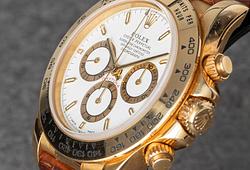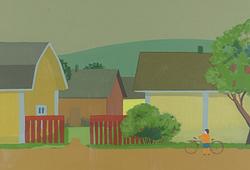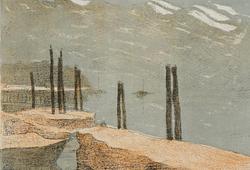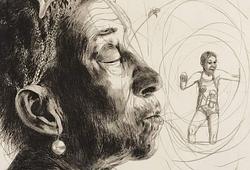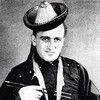GUANYIN, trä. Ming dynastin (1368-1644).
Stående på dubbel lotustron bärandes en löst hängande dhoti runt axlarna och ett skynke runt höften, dekorerad med halsband. Tiaran med en centrerad Amitahba Buddha mot den höga chignonen, två hårlockar böljar ner över axlarna, alvarligt ansiktstutryck med nedslagna ögon och vackra drag. Spår av färgpigment i olika färger. Höjd 126 cm.
Provenance: Formerly in the collection of Danish Archaeologist, Ethnographer, Art Collector and Museum Director Werner Jacobsen (1914-79). For more information, see below.
Torksprickor, skador. Renoverad, kompletterad.
Proveniens
Formerly in the collection of Danish Archaeologist, Ethnographer, Art Collector and Museum Director Werner Jacobsen (1914-79). Jacobsen studied archeology and participated 1938-39 in the Danish Royal Geografic Societys Expedition to Mongolia under the lead of Henning Haslund-Christensens.
During the years 1946-59 he lived in India and Nepal and acquired many pieces for National Museum in Denmark, The Royal Library, the Moesgård Museum and himself. He set up a scientific center in Kathmandu, Nepal and later in Denmark where he organized all the material and information he had gathered.
In 1940-45 he was employed the Danish National Museum, in 1961 he became Museum Director for the Etnografic Collection. 1963-78 he was the head of the information and educational Department at the Museum. The collection was acquired from Werner Jacobsen as a whole when he sold it to gather funds for new expeditions. Thence by descent to the present owner.
Litteratur
Werner Jacobsen published various literary and academic works such as; Bronzer fra Mongoliet, Köpenhamn, 1940, Some Observations on the Origin of Sino-sibirian Animal Bronzes, Köpenhamn 1941, Buddhsitisk Skulptur I Kina, Köpenhamn, 1941, Kabuki, det Japanska folks teater, Köpenhamn 1941, Todaerne, - en idisk bjergstamme, Köpenhamn 1949, Maleri fra Puri, Orissa, Indien, Köpenhamn 1961, Thailand, Arkeologi og Kunst, Köpenhamn 1961. Originale Bloktryk fra Nepal, Köpehamn, 1966, Asiatiske Akkorder, Köpenhamn 1965, Buddha og det modern menneske, Köpenhamn, 1970, Kunsten, kunstneren og inderen, Köpenhamn, 1970, Den hvide mans byrde, Köpenhamn, 1970, Hvad er den egentlige virkelighed, Köpenhamn, 1976, Den hvide gud, Köpenhamn, 1973.
Övrig information
This lot has a document from Uppsala University, Ångströmlaboratoriet, with the result from a 14C (radiocarbon determination).
This imposing figure represents the bodhisattva Guanyin, the Goddess of Compassion and Mercy. The size and ease in pose, together with the traces of pigment, hint at the original visual effect this figure would have had on visitors to the temple. The carver has skilfully captured the serenity and warmth of Guanyin, who is usually depicted as a beautiful female figure with a gentle smile and adorned in worldly accessories such as ornate tiaras and necklaces to emphasise her non-ethereal status, in sharp contrast to the stripped-back images of the Buddha. As it was believed that anyone who recited Guanyin’s name during times of distress would be rescued by her, she is the most worshipped deity in Buddhism and has therefore been frequently depicted in sculptural form.




